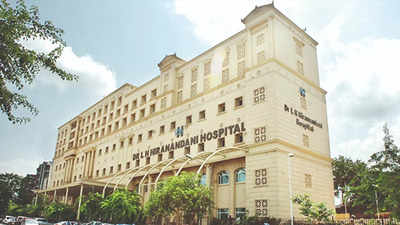- News
- City News
- mumbai News
- Mumbai: 5 years on, organ transplants resume in Hiranandani hospital
Trending
This story is from March 25, 2022
Mumbai: 5 years on, organ transplants resume in Hiranandani hospital
Five and a half years after a kidney racket was busted on its premises, Powai’s L H Hiranandani Hospital recently resumed its organ transplant programme. The state government has reinstated the hospital’s transplant licence on the condition that the doctors implicated in the case cannot be associated with the programme.

L H Hiranandani hospital
MUMBAI: Five and a half years after a kidney racket was busted on its premises, Powai’s L H Hiranandani Hospital recently resumed its organ transplant programme. The state government has reinstated the hospital’s transplant licence on the condition that the doctors implicated in the case cannot be associated with the programme.
The hospital started its transplant programme in January by operating on a man in his 20s who received a kidney from his brother.But, not wanting to take chances, the hospital called for a DNA test to establish their claim of being related, sources said. The transplant was carried out after the DNA results showed a match.
On July 14, 2016, as doctors prepared to carry out a kidney transplant on Surat-based businessman Brijkishore Jaiswal (48), a team of policemen barged in. They were informed that the woman in the adjoining operation theatre, Rekha, who was shown as the donor, was not Jaiswal’s wife. Instead, she was a maid from Gujarat who had agreed to sell her organ for a few lakh rupees. The state’s Directorate of Health Services (DHS) had suspended the hospital’s transplant licence the next day.
“We granted them the kidney transplant licence about four to five months ago after much scrutiny. We have put several conditions, primarily that none of the three doctors named in the charge sheet can participate in the transplant programme,” said Dr Arun Yadav, assistant director, DHS. The licences of nephrologist Dr Mukesh Shete, urologists Dr Mukesh Shah and Dr Prakash Shetty, named in the charge sheet, continue to be suspended, he said.
Dr Chatterjee, who was also taken in custody along with the other doctors and later released on bail, said the hospital was never named in the charge sheet filed three months later. “They had found a few individuals to be involved. However, the hospital was never a part of the racket,” he said, adding they plan to focus on transplants aggressively now.
The hospital last month also received permission to start liver transplants and is awaiting a nod for heart and lung transplants, Dr Yadav said.
Nephrologist Dr Rajesh Kumar said the transplant team has been put together bit by bit over the past several months. “Just because of one incident where the hospital was a victim, the transplant programme cannot suffer eternally,” said the doctor. He added the hospital has a brand new team with medical social workers and transplant coordinators who would contribute to cadaver organ donation.
The kidney trial is pending before Andheri magistrate court.
The hospital started its transplant programme in January by operating on a man in his 20s who received a kidney from his brother.But, not wanting to take chances, the hospital called for a DNA test to establish their claim of being related, sources said. The transplant was carried out after the DNA results showed a match.
On July 14, 2016, as doctors prepared to carry out a kidney transplant on Surat-based businessman Brijkishore Jaiswal (48), a team of policemen barged in. They were informed that the woman in the adjoining operation theatre, Rekha, who was shown as the donor, was not Jaiswal’s wife. Instead, she was a maid from Gujarat who had agreed to sell her organ for a few lakh rupees. The state’s Directorate of Health Services (DHS) had suspended the hospital’s transplant licence the next day.
“We granted them the kidney transplant licence about four to five months ago after much scrutiny. We have put several conditions, primarily that none of the three doctors named in the charge sheet can participate in the transplant programme,” said Dr Arun Yadav, assistant director, DHS. The licences of nephrologist Dr Mukesh Shete, urologists Dr Mukesh Shah and Dr Prakash Shetty, named in the charge sheet, continue to be suspended, he said.
Before the bust, the hospital had performed more than 300 live and cadaver transplants. Hospital CEO Dr Sujit Chatterjee told TOI: “We have put a tremendous amount of checks and balances. But one must understand that a professional gang hit us. They are still probably operating somewhere,” he said.
Dr Chatterjee, who was also taken in custody along with the other doctors and later released on bail, said the hospital was never named in the charge sheet filed three months later. “They had found a few individuals to be involved. However, the hospital was never a part of the racket,” he said, adding they plan to focus on transplants aggressively now.
The hospital last month also received permission to start liver transplants and is awaiting a nod for heart and lung transplants, Dr Yadav said.
Nephrologist Dr Rajesh Kumar said the transplant team has been put together bit by bit over the past several months. “Just because of one incident where the hospital was a victim, the transplant programme cannot suffer eternally,” said the doctor. He added the hospital has a brand new team with medical social workers and transplant coordinators who would contribute to cadaver organ donation.
The kidney trial is pending before Andheri magistrate court.
End of Article
FOLLOW US ON SOCIAL MEDIA











